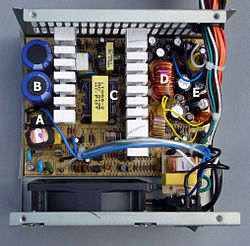Power System Problem
PC power system problem solution guide. If a system boots successfully to the Windows desktop, you still might have a power system problem. Some problems are intermittent, that is, they come and go.
Here are some symptoms that might indicate an intermittent problem with the electrical system after the boot.
- The computer stops or hangs for no reason. Sometimes it might even reboot itself.
- Memory errors appear intermittently.
- Data is written incorrectly to the hard drive.
- The keyboard stops working at odd times.
- The motherboard fails or is damaged.
- The power supply overheats and becomes hot to the touch.
- The power supply fan becomes very noisy or stops Generally, intermittent problems (those that come and go) are more difficult to solve than a dead system.
Power System Problem With An Inadequate Power Supply

If you have just installed a new device such as a second hard drive or a DVD drive and are con-cerned that the power supply is not adequate, you might test it after you finish the installation. Make all the devices in your system work at the same time.
For instance, you can make both the new drive and the floppy drive work at the same time by copying files from one to the other. If the new drive and the floppy drive each work independently, but data errors occur when both work at the same time, suspect a shortage of electrical power.
If you prefer a more technical approach, you can estimate how much total wattage your system needs by calculating the watts required for each device and adding them together. Calculate watts by multiplying volts in the circuit by amps required for each device.
However, in most cases, the computer's power supply is more than adequate if you add only one or two new devices. Power supplies for microcomputers range from 200 watts for a small desktop computer system to 600 watts for a tower floor model that uses many multimedia or other power-hungry devices. If you suspect your power supply is inadequate for newly installed devices, upgrade to one with a higher wattage rating.
Power System Problem With The Power Supply, Boards, Or Drives
The power supply might be faulty or not be adequate for power needs, or components drawing power might be bad. These problems can cause the system to hang, reboot, give intermittent errors, or not boot at all.
Expansion boards or drives might be defective and drawing too much power. Remove all nonessential expansion cards (modem, sound card, mouse) one at a time. This verifies that they are not drawing too much power and pulling the system down.
A system with a standard power supply of about 250 watts that has multiple hard drives, multiple CD drives, and several expansion Cards is most likely operating above the rated capacity of the power supply, which can cause the system to unexpectedly reboot or give intermittent, otherwise unexplained errors.
Upgrade the power supply as needed to accommodate an overloaded power system. If these suggestions don't correct the problem, check the power supply by exchanging it for one you know is good.
You can use a multimeter to measure the voltage output of a power supply and determine if it is supplying correct voltages, but know that a power supply that gives correct voltages when you measure it might still be the source of problems, because power problems can be intermittent.
See Also...




